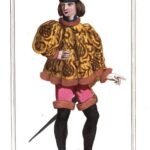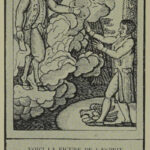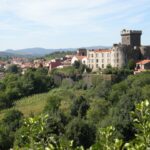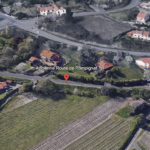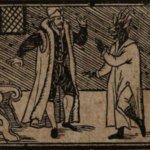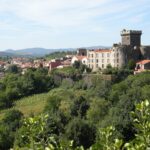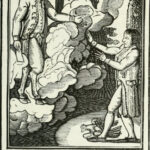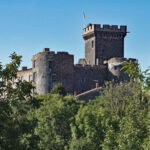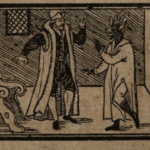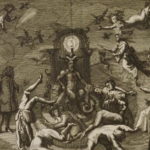In Auvergne, the Devil comes those who implore him with special rituals.
– Paul Sébillot
Early on the morning of 8 February 1427, armed enforcers of Constable Arthur de Richemont — the most powerful military official in the Kingdom of France — descended on the rural village of Issoudun. Their orders were clear: arrest Pierre II de Giac, the Lord of Châteaugay — a far-flung hill town in the forested and wolf-haunted solitudes of Auvergne. As soon as De Giac opened the door of his mansion and saw the soldiers staring back at him — weapons drawn — he knew the game was up. “I’m dead,” he gasped.

De Giac, not unlike his peers, had exploited his seigneurial privileges in the most heinous of ways. Years earlier, he had murdered his pregnant wife by forcing her to drink poison. During his tenure as Chancellor of France, De Giac had also misappropriated government funds to amass a personal fortune. Notwithstanding all this, De Giac’s downfall had little to do with his moral turpitude. Rival interests at court — mafiosi as it were — wanted him gone; De Richemont and his circle envied what they perceived as his undue influence over Charles VII, king of France.

During his trial, De Giac said that he had given the devil “one of his hands” in order to summon him “at his demand”. After a bailiff appointed by De Richemont sentenced him to death, De Giac — in a last attempt to save his life — begged his captors to sever his last connection to the devil: his hand. Nothing however, could sway the constable and his men. De Giac was subjected to the noyade, death by drowning. He was conveyed to the Auron river near Bourges, bound in a sack, and dumped into the current. So ended the life of the “devil” of Châteaugay.

Questions remain about De Giac’s professed alliance with the devil. Was it a ploy? What was he really up to? Dead men, of course, tell no tales. Nevertheless, if popular tradition can be believed, De Giac was not the only resident of Châteaugay to have dabbled in the occult. Local folklore has it that a hill near the Ancienne Route de Pompignat, a historic crossroads on the village’s outer limits, was a meeting place for strange nocturnal dances. “Women dressed all in black danced in circles at night,” wrote folklorist François Pommerol in an 1898 article for the Revue Des Traditions Populaires “Many who saw them were greatly frightened.” Pommerol also mentioned that people in the area had seen “burning carriages” moving between certain houses. The devil himself had even made an appearance, kidnapping a young woman in the middle of the night.

To the modern visitor of Châteaugay, these reports of diableries may come as a surprise. Gone are the ancient woodlands and weather-beaten manors of De Giac’s devilish days. Nowadays, all is sunshine, vineyards, and open-air. Châteaugay’s centrepiece is its melancholy castle, which looms over the town like an old, grey-haired sovereign. Once upon a time, a gloomy De Giac wandered among its halls and ramparts, plotting his evil-doings and charting his political rise. Perhaps he, like the legendary wizard Johann Faust, was accompanied in his meanderings by his own fork-tongued Mephistopheles.

These days, curious travellers are free to explore De Giac’s castle — and perhaps encounter his ghost — with approved tour guides in June and August. Its keep, which offers extraordinary views of the puy de Dôme and the Limagne plain, allows one to imagine what De Giac’s deal with the devil might have looked like.
The devil, levitating above the tower and waving his hand across the horizon, thunders: “Give me your hand and I will give thee dominion of princely realms beyond the mountains.” De Giac gleefully accepts the offer. Aided by his infernal guide, he climbs to the heights of power and gains favour in the eyes of the king. But the politicking Auvergnat lordling is unaware of the dear price he will have to pay in exchange for his misdeeds. As the old saying goes, in the end, the devil will always strangle his sorcerers. Inevitably, De Giac has his breath literally squeezed out of him as he spirals in the eddies of a murky river, far away from the place he once called home. Perhaps this is how it all went down. Perhaps.
To receive more information on “Occult Auvergne” — sign up for our newsletter below!




